Pavićević: UCG kao Alma mater, zajednica profesora i studenata koji tragaju za istinom
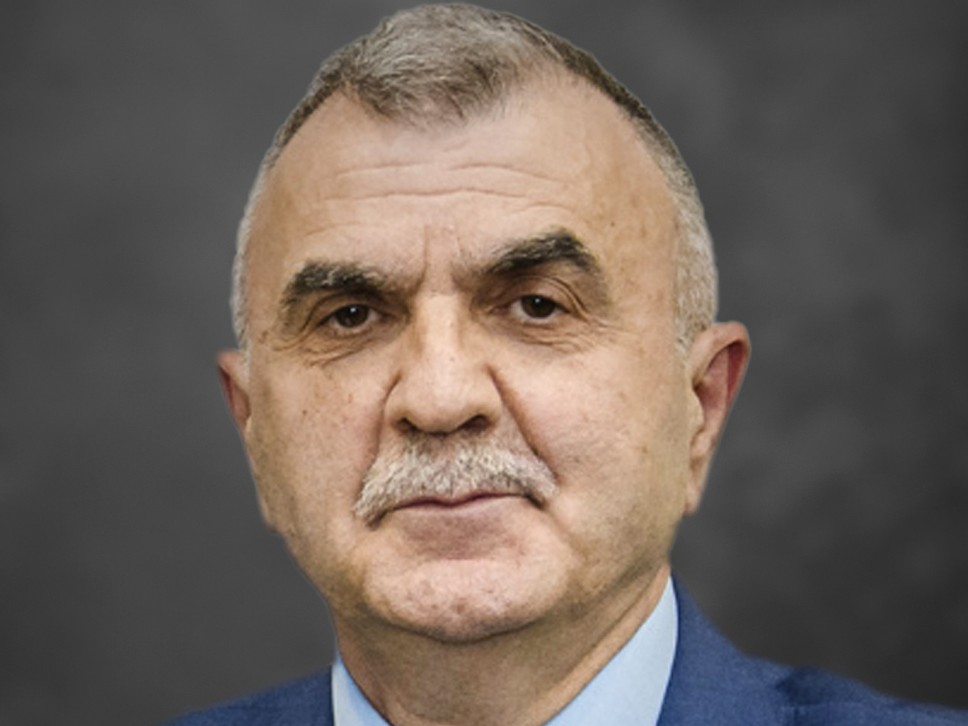
U pet decenija postojanja Univerziteta Crne Gore veliki broj profesora, asistenata i studenata je uticao na oblikovanje i unapređenje ove obrazovne institucije. Ipak, posebno treba istaći one profesore koji su svoj radni vijek u potpunosti posvetili UCG-u, te zaslužili zvanje profesora emeritusa.
Od redovnih profesora Univerziteta u penziji koji danas nose ovo zvanje ovog puta ističemo dr Žarka Pavićevića, profesora Prirodno-matematičkog fakulteta UCG. Profesor Pavićević je za 44 godine rada na PMF-u ostvario značajne rezultate u nauci, ali i u obezbjeđivanju nastavno-naučnog podmlatka, te zahvaljujući tome dobio više nacionalnih priznanja, nagradu Oktoih, Trinaestojulsku nagradu i Decembarsku nagradu Podgorice. Bio je prodekan (1990-1994) i dekan PMF-a (1994-1998). Jedan je od utemeljivača časopisa Mathematica Montisnigri koji izlazi od 1993. godine, a o njegovom radu govori i podatak da je 2015. godine izabran za profesora na Nacionalnom istraživačkom nuklearnom univerzitetu iz Moskve.
Povodom značajnog jubileja Univerziteta, Pavićević je ukazao na značaj ove obrazovne institucije, te podijelio savjete i poruke koji mogu da inspirišu nove generacije.
Kakvu je ulogu u Vašem životu i usavršavanju odigrao Univerzitet Crne Gore? Koliko Vas je inspirisao i usmjerio za dalje ciljeve?
PAVIĆEVIĆ: Za mene Univerzitet Crne Gore je Alma mater, majka hraniteljica, ona koja hrani dušu sa znanjem i mudrošću i svim ostalim ljudskim vrlinama. I kao svaka majka koja usmjerava život svog djeteta sa željom da on bude ispunjen i uspješan, tako je i ova majka usmjeravala moj profesionalni razvoj, rad i stvaralaštvo. Kroz naučna usavršavanja, studijske boravke na raznim univerzitetima, učešće na domaćim i inostranim konferencijama i seminarima, obezbjeđivanjem što boljih uslova za nastavni rad, podsticanje, a bogami i zahtjev da savjesno, posvećeno i odgovorno pristupamo svakom poslu, UCG je odigrao, a i dalje igra važnu ulogu i inspiriše da nastavim, koliko je to u mojoj intelektualnoj i fizičkoj moći, da koračam stazom koju trasira naš Univerzitet.
Prisjećam se profesora Univerziteta Crne Gore iz vremena kada sam bio mlad - asistent pripravnik i asistent. 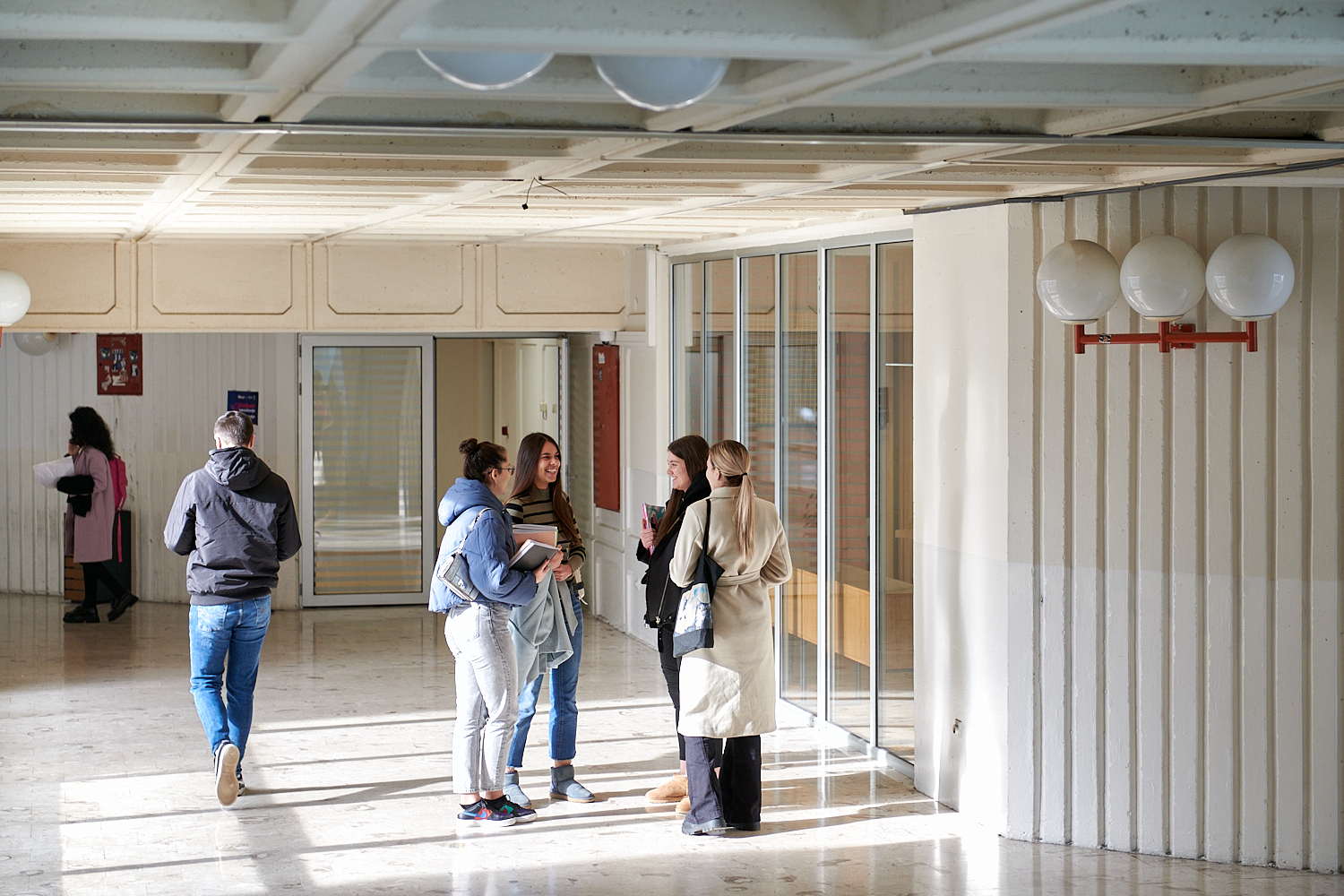 To su bili izuzetni ljudi, širokih pogleda, izuzetnog držanja, posvećeni svom poslu, spremni da posavjetuju i pomognu mlađe kolege. Ljudi za uzor, koji su inspirisali i usmjerili moj budući rad na Univerzitetu i na neki način moj budući životni put. Još tada sam shvatio da univerziteti nijesu samo naučno-obrazovne, nego i vaspitne institucije. Mnogo puta sam to isticao na našem Univerzitetu. Naime, univerziteti ne vaspitavaju studente onako kako se to radi sa učenicima u osnovnoj i srednjoj školi. Vaspitanje na univerzitetima se stiče kroz međusobni odnos profesora i asistenata, njihov odnos prema studentima, prema kolegama, prema poslu i obavezama. Vaspitanje se odvija kroz uzore.
To su bili izuzetni ljudi, širokih pogleda, izuzetnog držanja, posvećeni svom poslu, spremni da posavjetuju i pomognu mlađe kolege. Ljudi za uzor, koji su inspirisali i usmjerili moj budući rad na Univerzitetu i na neki način moj budući životni put. Još tada sam shvatio da univerziteti nijesu samo naučno-obrazovne, nego i vaspitne institucije. Mnogo puta sam to isticao na našem Univerzitetu. Naime, univerziteti ne vaspitavaju studente onako kako se to radi sa učenicima u osnovnoj i srednjoj školi. Vaspitanje na univerzitetima se stiče kroz međusobni odnos profesora i asistenata, njihov odnos prema studentima, prema kolegama, prema poslu i obavezama. Vaspitanje se odvija kroz uzore.
Dakle, Univerzitet Crne Gore čine ljudi – nastavnici, saradnici, studenti i svi ostali zaposleni, koji posvećeno rade, stvaraju i studiraju na njemu. Posebno bih želio da istaknem da je Univerzitet Crne Gore bio i ostao Alma mater cijelog crnogorskog društva, bez obzira na niz privatnih visokoškolskih ustanova. Na tome treba insistirati u javnosti, a posebno kod inokosnih organa koji upravljaju državom Crnom Gorom. Raditi na UCG 44 godine u stalnom radnom odnosu, i sljedeće tri kao profesor emeritus, i sve to vrijeme nastojati da živiš životom Univerziteta, predstavlja inspiraciju i podsticaj za dostizanje želja i ciljeva koje čovjek uvijek postavlja u svom životu.
Koliko Vam znači zvanje profesora emeritusa koje Vam je uručeno 2022. godine? Kakav je osjećaj nalaziti se na izuzetnom spisku ljudi koji su zaslužili ovo zvanje?
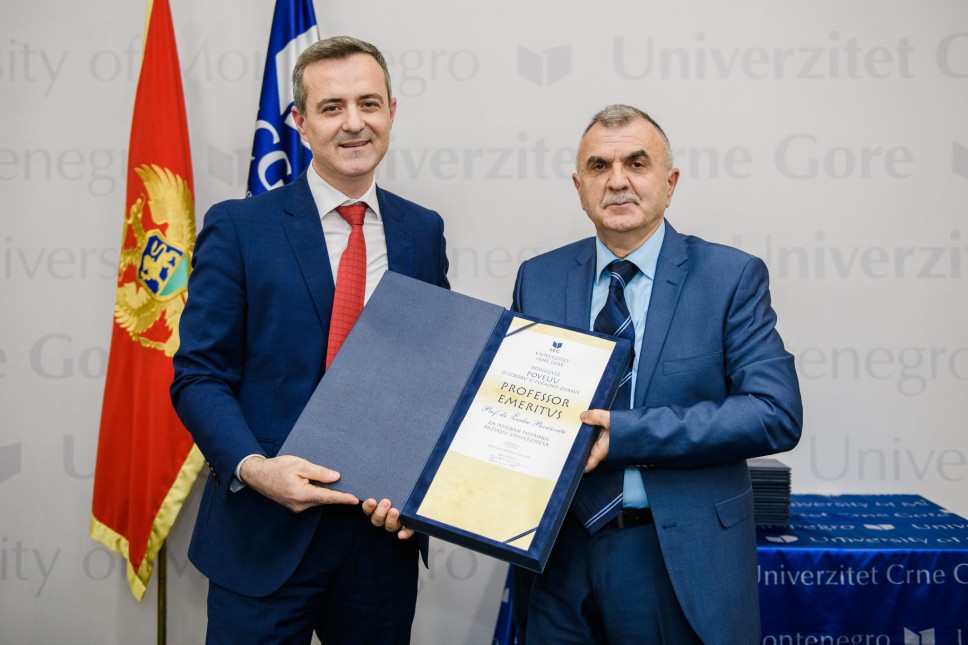 PAVIĆEVIĆ: Dobiti zvanje profesora emeritusa predstavlja izuzetnu čast, ali i odgovornost i obavezu za budući rad. Veliko je priznanje dobiti to zvanje, tim prije što dolazi od sredine u kojoj sam radio 44 godine, od koleginica i kolega koji su prepoznali moj rad, a vjerujem i ukupni odnos koji sam imao prema studentima i zaposlenim na UCG.
PAVIĆEVIĆ: Dobiti zvanje profesora emeritusa predstavlja izuzetnu čast, ali i odgovornost i obavezu za budući rad. Veliko je priznanje dobiti to zvanje, tim prije što dolazi od sredine u kojoj sam radio 44 godine, od koleginica i kolega koji su prepoznali moj rad, a vjerujem i ukupni odnos koji sam imao prema studentima i zaposlenim na UCG.
Osjećaj da ste u ”društvu” profesora koji su svojim radom i zalaganjem gradili UCG, posvetili mu ono najbolje u svom životu, je izuzetan i jako emocionalan. Odgovornost je velika, jer na neki način reprezentujete Univerzitet, zvanje univerzitetskog profesora, svoj nastavni rad, svoje prethodno naučno stvaralaštvo. Mogu reći da ovo zvanje sadrži, u krajnjem, vaše stavove i poglede na život. Obaveze profesora emeritusa nijesu male, ako mu zdravlje dozvoljava da ih ispunjava. Mislim da se sastoje u maksimi: “Nastavi istim životnim pute.”
Koliko su profesori i studenti PMF-a doprinijeli crnogorskom društvu u prošlosti, te kakav je danas značaj PMF-a za Crnu Goru?
PAVIĆEVIĆ: Ako se pogleda razvoj civilizacije može se zaključiti da samo onda kada su se dešavali prodori u razvoju matematike i prirodnih nauka, tada je dolazilo do napretka ljudske civilizacije. To svjedoči antička Grčka, Rimska imperija, srednji vijek, novo doba. Na primjer, trivijum (raskršće sa tri puta) koji se sastojao iz gramatike, retorike i logike, kao i kvadrivijum (raskršće sa četiri puta) koji sa trivijumom čine četiri od sedam slobodnih vještina: aritmetika, astronomija, geometrija i muzika, koje su se proučavale na srednjovjekovnim univerzitetima, a koje su preuzete iz antičkih vremena, dovoljno govore o značaju znanja prirodnih nauka i matematike za razvoj društva. I današnje savremeno društvo se temelji na dostignućima prirodnih nauka i matematike i često se kaže da je to zlatno doba nauke. Svaka zajednica koja nije u stanju da prati šta se dešava u tim naukama, kaska sa razvojem i podložna je propadanju. To ukazuje da je doprinos PMF-a crnogorskom društvu velik, a ja bih rekao nemjerljiv.
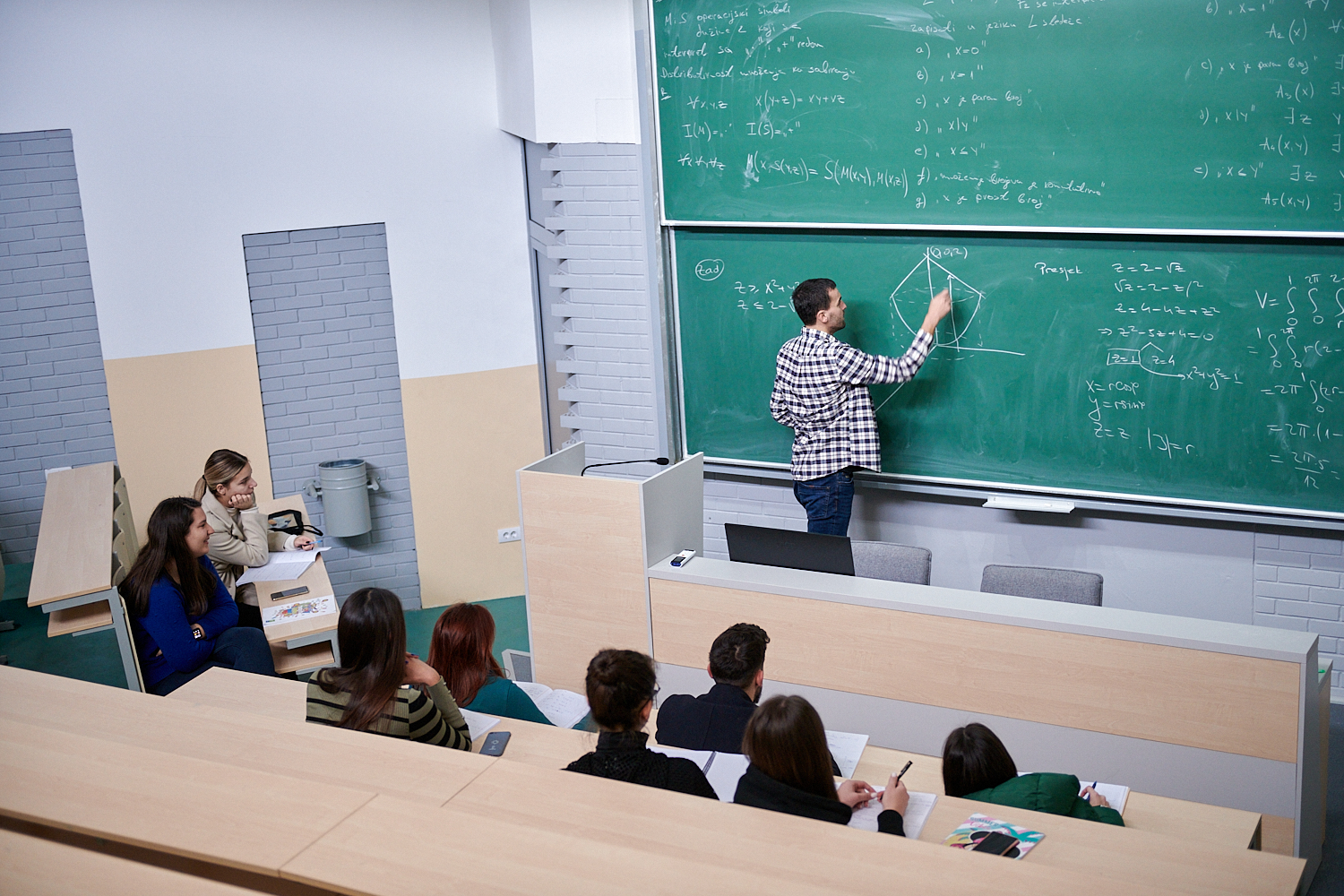 Naime, profesori i saradnici PMF-a imaju rezultate koje izlažu na mnogim međunarodnim naučnim konferencijama i seminarima. Svoje radove publikuju u prestižnim naučnim časopisima. Većina kolega sa PMF-a je imalo studijske boravke na prestižnim svjetskim univerzitetima i institutima gdje su učestvovali u istraživanjima tih univerziteta i instituta. Na njima su držali i predavanja. Nastavnici sa PMF-a su nosioci značajnih naučnih projekata koji se finansiraju iz fondova Evropske unije ili Ministarstva prosvjete, nauke i tehnološkog razvoja CG.
Naime, profesori i saradnici PMF-a imaju rezultate koje izlažu na mnogim međunarodnim naučnim konferencijama i seminarima. Svoje radove publikuju u prestižnim naučnim časopisima. Većina kolega sa PMF-a je imalo studijske boravke na prestižnim svjetskim univerzitetima i institutima gdje su učestvovali u istraživanjima tih univerziteta i instituta. Na njima su držali i predavanja. Nastavnici sa PMF-a su nosioci značajnih naučnih projekata koji se finansiraju iz fondova Evropske unije ili Ministarstva prosvjete, nauke i tehnološkog razvoja CG.
Mnogi naši svršeni studenti su nastavili školovanje u inostranstvu, gdje su odbranili magistarske radove i doktorske disertacije, i nastavili svoju profesionalnu karijeru. U tim sredinama su prepoznati kao izuzetni specijalisti. Sve navedene aktivnostima govore da PMF afirmiše ne samo UCG, nego i državu Crnu Goru na međunarodnoj naučnoj “sceni”.
I ne samo to. PMF je dao veliki doprinos razvoju UCG. Veliki je doprinos UCG-u u formiranju Medicinskog fakulteta, Građevinskog fakulteta, prerastanju Više pomorske škole u Kotoru u fakultet... Profesori i saradnici našeg fakulteta izvode nastavu iz matematike i prirodnih nauka na ostalim univerzitetskim jedinicama čime daju doprinos radu tih jedinica.
Svršeni studenti PMF-a su, kod nas, prepoznati kao veoma kvalitetan kadar. Otuda lako nalaze posao u Crnoj Gori. Na Birou rada skoro i da nema ovog profila koji traži posao. Posebno ističem veliki doprinos koji je PMF dao razvoju i primjeni informacionih tehnologija. Naši nastavnici i saradnici su realizovali niz projekata za informatičku pismenost mladih, uvođenje informacionih tehnologija u mnoge sfere društva, konsultantske poslove itd.
Ovdje treba reći da se danas naš obrazovni sistem, na svim nivoima, susreće sa nedostatkom nastavnog kadra za matematiku, fiziku i hemiju. Možete zamisliti kakvo bi bilo stanje u osnovnim i srednjim školama da se taj kadar nije školovao na PMF-u. No i pored toga, problem je veliki, jer mladi ne žele da rade u prosvjeti. Treba napraviti napor, sa državom, da se ovaj problem što prije riješi.
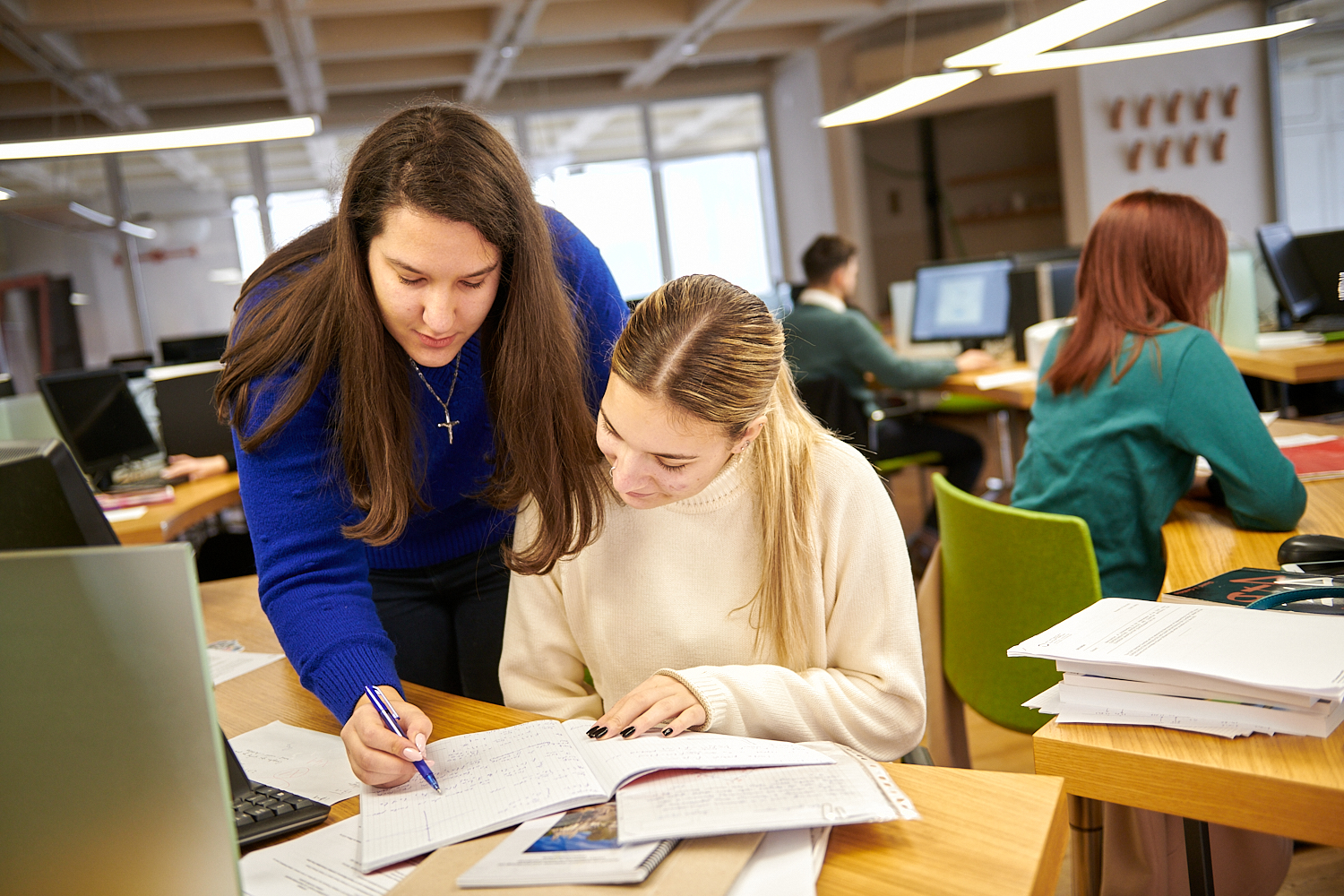 Mladi i djeca matematiku često doživljavaju kao bauk. Kako biste ih Vi ohrabrili da se ipak upuste u ljepotu matematičkih prostranstava?
Mladi i djeca matematiku često doživljavaju kao bauk. Kako biste ih Vi ohrabrili da se ipak upuste u ljepotu matematičkih prostranstava?
PAVIĆEVIĆ: Matematika nije bauk. Baukom su je napravili odrasli, roditelji i možda jedan dio nastavnika matematike. Istraživanja pokazuje da svaki učenik koji je spreman da određeno vrijeme posveti učenju matematike može odlično da vlada matematičkim sadržajima. Djecu treba motivisati na to. Evo jednog načina koji potiče od jednog mađarskog matematičara. Naime, taj matematičar svojim učenicima i studentima kaže, parafraziram: Da bi naučili da rješavate matematičke zadatke, to možete uraditi na isti način na koji ste naučili da plivate. Pa kako ste naučili da plivate: prvo ste ušli u vodu, a zatim ste u vodi širili ruke i noge, iznova, pa iznova …. Tako i matematičke zadatke rješavate, morate prvo pročitati zadatak, pa ga pokušati riješiti, ako ne ide, ponovo ga rješavajte, pa ponovo iznova sve dok ga ne riješite. Sve ovo treba raditi bez straha i kompleksa.
Treba sa djecom raditi interesantne zadatke, matematičke “smicalice”, pričati im interesantne anegdote iz života matematičara, isticati značaj matematičkog znanja, jer matematika kod djece, osim matematičkih znanja i vještina koje dovode do njihovog intelektualnog razvoja, utiče na njihov kulturni, duhovni, estetski, moralni i stvaralački razvoj.
Treba imati na umu da matematičko znanje, pored znanja jezika, predstavlja bazu na kojoj počiva cjelokupno obrazovanje učenika. To najbolje ilustruju riječi čuvenog italijanskog renesansnog arhitekte, pronalazača, inženjera, vajara i slikara Leonarda da Vinčija koji kaže: “Vi koji učite, učite matematiku. Ne gradite bez temelja.” Otuda matematičkoj pismenosti i obrazovanju treba poklanjati posebnu pažnju.
Šta biste poručili Univerzitetu za njegov 50. rođendan? Kakve savjete za budućnost biste dali?
PAVIĆEVIĆ: Vjerujem, da student, profesori i svi zaposleni na UCG doživljavaju Univerzitet kao Alma mater, jer ona je majka hraniteljica svih, u bukvalnom smislu riječi. Otuda posvećenost i predanost poslu treba da bude na prvom mjestu svih zaposlenih na Univerzitetu.
Da bi Majka hraniteljka mogla da hrani svoju djecu mora da ima pomagače bez kojih ne bi mogla obavljati svoj uzvišeni i humani zadatak. A pomagači UCG su osnovne i srednje škole. Otuda bih preporučio da UCG razvije saradnju sa osnovnoškolskim i srednjoškolskim ustanovama obrazovanja. Dobar primjer bi bilo uspostavljanje saradnje sa matematičkim, filološkim i sportskim odjeljenjima gimnazija i drugim profilima. Takva saradnja je devedesetih godina postojala sa odjeljenjem matematičke gimnazije, i pokazala se veoma korisnom za UCG.
Moj savjet za budućnost bi bio: Gradite Univerzitet kao zajednicu profesora i studenata koji su maksimalno posvećeni svom poslu, pristupaju mu odgovorno, svjesni da bez takvog pristupa nema uspjeha. Gradite Univerzitet kao zajednicu profesora i studenata koji tragaju za istinom, kao zajednicu sa samoupravom, kao zajednicu sa punom autonomijom.
Koristim priliku da svim zaposlenim i studentima Univerziteta čestitam ovaj značajan jubilej i da im poželim uspjeh u radu, a u ličnom životu dobro zdravlje, sreću i puno radosti.

